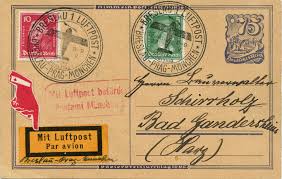Stamp: Zeppelin (Equatorial Guinea 1974)
Zeppelin (Equatorial Guinea 1974)
30 May (Equatorial Guinea ) within release 100 years Universal Postal Union (UPU) goes into circulation Stamp Zeppelin face value 1.50 Equatorial Guinean ekuele
| Stamp Zeppelin in catalogues | |
|---|---|
| Michel: | Mi:GQ 386 |
| Yvert et Tellier: | Yt:GQ 46E |
Stamp is horizontal format.
Stamp Zeppelin it reflects the thematic directions:
The mail or post is a system for physically transporting documents and other small packages; or, the postcards, letters, and parcels themselves. A postal service can be private or public, though many governments place restrictions on private systems. Since the mid-19th century national postal systems have generally been established as government monopolies with a fee on the article prepaid. Proof of payment is often in the form of adhesive postage stamps, but postage meters are also used for bulk mailing. Modern private postal systems are typically distinguished from national postal agencies by the names "courier" or "delivery service". Postal authorities often have functions other than transporting letters. In some countries, a postal, telegraph and telephone (PTT) service oversees the postal system, in addition to telephone and telegraph systems. Some countries' postal systems allow for savings accounts and handle applications for passports.
The Universal Postal Union (UPU, French: Union postale universelle) is a specialized agency of the United Nations (UN) that coordinates postal policies among member nations and facilitates a uniform worldwide postal system. It comprises 192 member states and is headquartered in Bern, Switzerland
A postmaster is the head of an individual post office, responsible for all postal activities in a specific post office. When a postmaster is responsible for an entire mail distribution organization (usually sponsored by a national government), the title of Postmaster General is commonly used. Responsibilities of a postmaster typically include management of a centralized mail distribution facility, establishment of letter carrier routes, supervision of letter carriers and clerks, and enforcement of the organization's rules and procedures. The postmaster is the representative of the Postmaster General in that post office.
Aviation is the practical aspect or art of aeronautics, being the design, development, production, operation and use of aircraft, especially heavier than air aircraft. The word aviation was coined by French writer and former naval officer Gabriel La Landelle in 1863, from the verb avier (synonymous flying), itself derived from the Latin word avis ("bird") and the suffix -ation.
Postal history is the study of postal systems and how they operate and, or, the study of the use of postage stamps and covers and associated postal artifacts illustrating historical episodes in the development of postal systems. The term is attributed to Robson Lowe, a professional philatelist, stamp dealer and stamp auctioneer, who made the first organised study of the subject in the 1930s and described philatelists as "students of science", but postal historians as "students of humanity". More precisely, philatelists describe postal history as the study of rates, routes, markings, and means (of transport).





